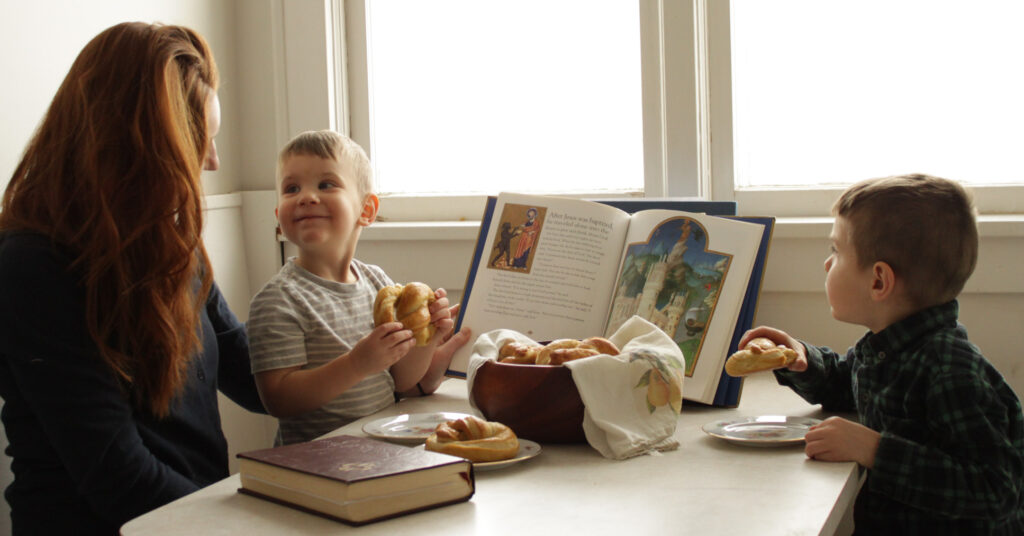This is the third installment of “Life in the Church Year,” a series by Dr. Kristen Einertson and Tessa Muench of All the Household. This series will provide guidance for living out the seasons of the Church Year at home with your families. Find month-by-month lists of Lutheran feasts, festivals and commemorations here.
This year, March brings the end of Epiphanytide, officially closing out the Christmas cycle. Immediately afterward, the church shifts its eyes to Easter, as it embarks on its 40-day trek toward the cross in the season of Lent. This begins with Ash Wednesday, when we hear the admonition, “you are dust, and to dust you shall return.”
Yet Lent will hardly be underway this year when the Christmas cycle breaks back in on March 25, as the church celebrates the Annunciation. Nine months before Christmas, the Annunciation commemorates the angel Gabriel’s declaration to the Virgin Mary that she would bear the Son of God. Even during this exuberant celebration of pre-Christmas joy, however, the Easter cycle is not overshadowed. Early Christians believed that Jesus died on the same date when He was conceived, a tradition that binds the Annunciation together with Good Friday and the season of Lent as a whole.
Christians will find many historic customs associated with this penitential season — especially the threefold disciplines of prayer, almsgiving and fasting.
In Lent, Christians should find ample opportunities to pray, including with other Christians at midweek services. Likewise, heads of households often lead more robust daily prayers with their families during this season.
Almsgiving, or giving that goes above and beyond a Christian’s regular cheerful tithing to the local congregation, is another Lenten custom that curbs the flesh from the love of earthly goods and wealth. By giving money to the needy or finding ways to bless others with their time and talents, Christians train themselves to rely on their Lord for sustenance.
Fasting is also a traditional Lenten discipline. Jesus Himself spoke of fasting as something in which Christians engage (Matt. 6:16). Of course, fasting is not for everyone, especially the sickly, pregnant or nursing, and children, but if you desire to join in this Lenten practice, ask your pastor for advice and seek out Lutheran resources.

Considering this last discipline, we offer you a recipe for one of the most long-standing Lenten fasting foods: pretzels. With only five ingredients, this bread is simple and free of several foods that Christians have often abstained from during Lent (meat, dairy, sugar). Ever since the fourth century, pretzels have been associated with this season and can remind Christians to keep their eyes on Christ: The bread is formed in the iconic shape of arms crossing in prayer, and its three holes represent the Triune God, encouraging Christians to take up an appropriate Lenten posture in body, soul and mind.
Lenten Pretzels
Ingredients:
1 ½ cups warm water 1 packet yeast ¼ cup olive oil, plus extra for brushing 1 tsp. salt, plus extra for topping 3 ½–4 cups all-purpose flour 1 Tbsp. baking soda
Instructions:
- Bloom the yeast in warm water. Stir in the oil and salt. Add the flour one-half cup at a time, mixing until a dough forms and begins to pull away from the bowl.
- Remove the dough and knead it until smooth. Place the dough in another greased bowl, cover, and let it rise until doubled.
- Preheat the oven to 350°F and heat a pot ¾ full of water to a boil on the stove. Dissolve the baking soda into the water.
- Once doubled, divide the dough into eight portions. Roll each into a long strand, then bring the ends together and twist them around one another twice, laying them down and pressing to seal the pretzel shape.
- Drop each pretzel into the boiling water and cook for 20–30 seconds. Remove the pretzel, let it drip briefly, and place it onto a lined baking sheet. Bake the pretzels for 20–30 minutes until cooked through.
- Remove the pretzels from the oven, brush with olive oil and sprinkle with salt. Enjoy!
Cover image: Tessa Muench




I so enjoyed this article and the threefold disciplines during Lent. And the Lenten fasting food of pretzels! I did not know of it’s historical practice in the church and the symbols it represents! Also they look so yummy and plan to make them!
Great article, and great recipe! I just tried it out, and the pretzels are delicious.
For those of us who have been blessed with an ample supply of food in our pantries and refrigerators and freezers, one option to fasting is to allow your household to simply run out of a food item that you are in the habit of including with your meals, and then “make do” with alternatives on hand, thanking God for the abundance.
_____________________
Re: “In Lent, Christians should find ample opportunities to pray….”
Using “should” here is problematic because it results in a statement that is “teaching as doctrines the commandments of men” (Matt. 15:9 ESV). People need not feel guilty for not changing their prayer habits for a few weeks.
“One person esteems one day as better than another, while another esteems all days alike. Each one should be fully convinced in his own mind” (Romans 14:6).
Yet this loving exhortation applies throughout the year: “In everything by prayer and supplication with thanksgiving let your requests be made known to God” (Phil. 4:6).
So rather than say “should” to encourage a beneficial practice that God does not require, it is more gracious and persuasive to describe the benefits that people have actually experienced and the anticipated blessings that Scripture speaks of: “And the peace of God, which surpasses all understanding, will guard your hearts and your minds in Christ Jesus” (Phil. 4:7).
Paul, thank you for your comment and for the helpful suggestion regarding fasting. I believe you are misinterpreting the sentence that contains the word “should,” and hope you will take a second look. The authors do not say “Christians should pray more during Lent,” but rather that “Christians should find ample opportunities to pray” — “should” here is not used as a verb of recommendation or obligation, but as a verb of expectation, that is, “Christians will likely find ample opportunities to pray,” referring of course to the proliferation of midweek services, special devotional materials, and the like that surround us during the Lenten season.
The use of the modal verb “should” to express expectation can be seen in other sentences like: When you get to the store, you should find the potatoes in the first aisle. When you get to church, you should find Christians at prayer.